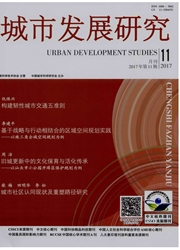

 中文摘要:
中文摘要:
在制度转型和城市空间扩张背景下,研究城市居民住房成本与通勤成本空间互动关系及群体需求差异,能够为城市住房政策和交通规划管理提供决策依据。基于《2016年天津市交通与住房调查问卷》数据,构建住房需求函数,探讨不同类型城市居民住房成本与通勤成本在城市空间结构中的互动关系。结果显示:住房成本与通勤成本显著负相关,但不同类型城市居民对二者之间的替代关系存在较大差异,其中住房补贴、通勤方式及职业类型等属性对居民住房成本与通勤成本之间替代关系具有较大影响。因此,从引导住房消费合理分层、优化公共交通体系功能层次及布局、推进城市副中心建设等方面提出政策建议,促进城市居民职住平衡。
 英文摘要:
英文摘要:
Under the background of the system transformation and the expansion of urban space, this paper researches the spatial interaction between urban residents' housing cost and commuting cost and the difference of their community needs, which provides decision basis for urban housing policy and transportation planning. On the basis of Tianjin Traffic and Housing Survey Questionnaire 2016, this paper sets up the housing demand function, then explores the relationship and regularity between housing cost and commuting cost in different types of urban residents. The results are as follows: there is a significant negative correlation between housing cost and commuting cost. The spatial opportunities in different types of urban residents show a large imbalance. Housing fund, walking and free occupation property, which leads housing and commuting consumption to have a significant substitution relationship in city space and emergence imbalance phenomenon. Government should guide housing consumption stratification reasonably, optimize the functional level and layout of public transport system, promote the construction of urban sub center demand to promote the city home- work separation balance.
 同期刊论文项目
同期刊论文项目
 同项目期刊论文
同项目期刊论文
 期刊信息
期刊信息
